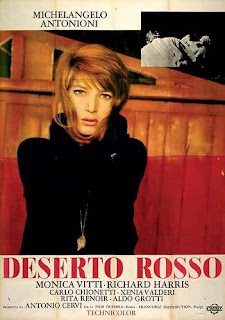Red Desert
 When I reviewed the films of Michelangelo Antonioni a few years ago I mentioned that the fourth of a tetralogy of films featuring Monica Vitti was not available on DVD. Now it is. Red Desert was Antonioni's first film in color and, as such, it is really an experiment in the use of color and sound. I can't pretend to know what it all means, and while it isn't exactly action-packed, it's interesting.
When I reviewed the films of Michelangelo Antonioni a few years ago I mentioned that the fourth of a tetralogy of films featuring Monica Vitti was not available on DVD. Now it is. Red Desert was Antonioni's first film in color and, as such, it is really an experiment in the use of color and sound. I can't pretend to know what it all means, and while it isn't exactly action-packed, it's interesting.Antonioni got the idea for the film while visiting Ravenna, a seaside Italian town. He'd been there a hundred times before, but on this visit he realized how industry had changed the landscape. Antonioni is quick to point out he is not against industry or progress, instead feeling that the images of industry have their own particular beauty. I'm not sure beauty is the word I'd use, but his images are striking.
Vitti plays the wife of the manager of a chemical plant. She has recently attempted to commit suicide, and throughout the film she struggles to fit into the modern world. She has a young son (his favorite toy, pointedly, is a robot). Visiting the plant is Richard Harris as a man looking to recruit workers to South America. He and Vitti spend a lot of time together, and she finds that she is able to open up to him more effectively than her husband.
I can't really detail much more of the plot, I'm not sure there really is a plot. There is a long middle section that has a group of married couples having a kind of love-in in a seaside shack, and there quite a few shots of ships, sometimes seeming to sail across land. I think the story is really beside the point, as Antonioni instead speaks with color. Much of the film is monochromatic--he went so far as to paint trees to make them more gray--but at times the color red is so prominent that it screams out at us. I'm reminded of someone who gets a new camera for Christmas and tries out all the different bells and whistles.
There is also an unusual use of sound. Antonioni uses a lot of electronic noise, some of which is common to science-fiction films. There is also the periodic use of an opera singer hitting some high notes which at times make it sound like she's being murdered.
I didn't hate this film, or find it boring, but I would be resistant to calling it great or a classic. As usual with his films, it holds characters at an arm's length, not asking us to care about them, but instead regarding them like zoo animals.


Comments
Post a Comment